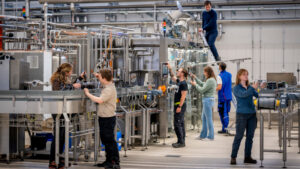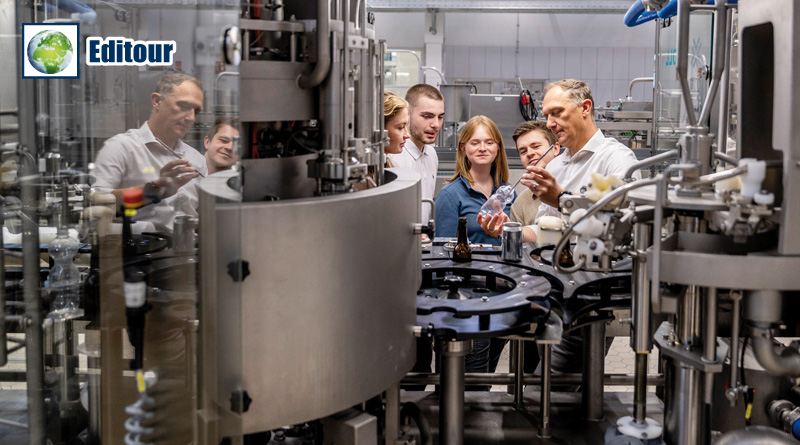Sustainability is the optimal way to preserve beverages
New Beverage Technology Centre Hochschule Geisenheim University
When travelling round the country looking into sustainability, you always come across new aspects. Our visit to the Getränkte Technologie Zentrum (GTZ) at Hochschule Geisenheim University in Germany was no exception. I am welcomed by Prof. Dr Ralf Schweiggert and the head of department, Dipl.-Ing. Michael Ludwig. The occasion is the new GTZ building of over 4,000 m2. It is here that the new Vipoll Small-in-One filler is used.
Photo top: Students talking to Michael Ludwig in the new Beverage Technology Center. (Photo: Hochschule Geisenheim / Torsten Silz)
We met: Dipl. Ing. Michael Ludwig, Head of Getränke Technologie Zentrum (GTZ) and Prof. Dr Ralf Schweiggert, Head of Institute of the Department of Beverage Research Professorship for Analysis & Technology of plant-based Foods – Focus on Beverages.
Hochschule Geisenheim University // March 5, 2025

The filler is a jack-of-all-trades, it can fill almost every conceivable type of beverage, including beer, RTDs, soft drinks (still & carbonated), wine & sparkling wine, water (still & carbonated) and juices (including pulps) in cans, glass or PET. The background to the investment is to find out under practical conditions how a particular beverage can best be preserved and bottled. This includes the optimal preparation of the filling products, the selection of suitable packaging and, if necessary, the selection of a post-treatment of the filled packaging. Product-specific filling systems were previously used, but this new filler now allows for greater variance and, above all, better comparability.
This makes it possible to compare the foaming behaviour during filling, test the highly sensitive products for vitamin stability, identify aromatic deviations and find the best shelf life method for the product, such as ultraclean filling, pasteurisation or the addition of velcorin, to name just a few aspects.
With all the know-how about filling products and packaging types, the topic of rPET is naturally also on the table. Prof Schweiggert once tried to find out the actual proportion of rPET in the finished bottle. However, the data did not provide a clear picture. In an investigation of researchers of the University of Applied Sciences and Arts in Lemgo a few years ago, they were able to show that the bottle contained rPET, but the determination of the exact proportion remained intricate.

With the new analytical methods in Geisenheim, he could look deeper into the material and imagine a way of improving the determination of the exact rPET content.
Beverage technology has a history of over 60 years in Geisenheim. The Beverage Technology Centre (GTZ) is of central importance here. Here, beverage technology products can be produced and filled under realistic conditions in different sizes and with a high degree of process engineering flexibility.
The “baby” of Dipl.-Ing. (FH) Michael Ludwig is responsible for the design, planning and new construction of the GTZ with laboratories, technical facilities and production areas. With an area of over 4,000 m², the GTZ offers a unique infrastructure for the practical training of Bachelor’s and Master’s students in all areas of beverage technology.
The new centre enables the practical processing of raw materials from the fruit and vegetable production sector into high-quality juices, nectars, spritzers and soft drinks.
Beer is brewed in two breweries and spirits and liqueurs are produced in the distillery. The range is complemented by the company’s own sparkling wine factory. The coffee laboratory with its own roastery is another pillar of the comprehensive beverage technology training programme.
In addition, a sensory laboratory and analytical laboratory are available for drinking and table water and other beverages. The GTZ combines teaching and research in an ideal way. It offers students sound practical training and enables them to carry out current research projects with a process engineering background.
Visit Hochschule Geisenheim University
About Prof. Dr Ralf Schweiggert:
Since 2003, Prof Schweiggert has been working in food technology with a focus on fluid foods and beverages such as wine and fruit juice. During his career, he studied and taught at the Department of Food Science and Technology at Ohio State from 2011 to 2012, at the Escuela de Tecnología de Alimentos of the Universidad de Costa Rica (San José, Costa Rica) from 2008 to 2011 and habilitated in 2017 in the field of technology and analysis of plant foods at the University of Hohenheim. Since 2018, he has headed the Institute for Beverage Research and holds the Professorship for Analysis and Technology of Plant-Based Foods at Hochschule Geisenheim University.

